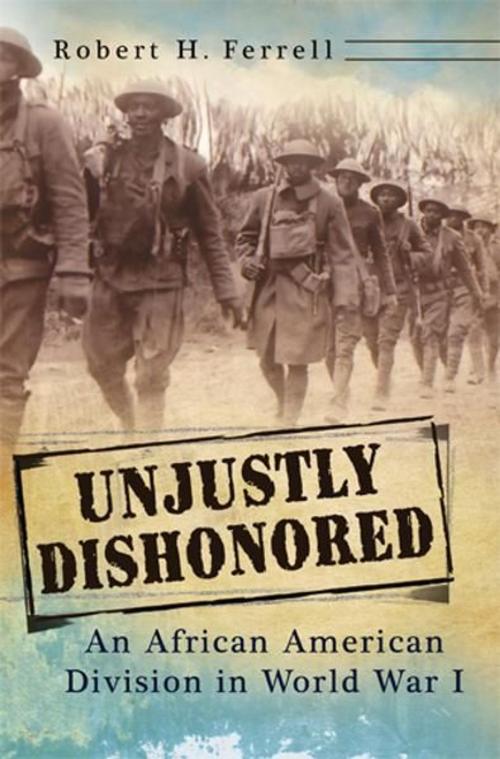Unjustly Dishonored
An African American Division in World War I
Nonfiction, History, Military, World War I| Author: | Robert H. Ferrell | ISBN: | 9780826272461 |
| Publisher: | University of Missouri Press | Publication: | May 20, 2011 |
| Imprint: | University of Missouri | Language: | English |
| Author: | Robert H. Ferrell |
| ISBN: | 9780826272461 |
| Publisher: | University of Missouri Press |
| Publication: | May 20, 2011 |
| Imprint: | University of Missouri |
| Language: | English |
For nearly one hundred years, the 92nd Division of the U.S. Army in World War I has been remembered as a military failure. The division should have been historically significant. It was the only African American division of the American Expeditionary Forces in France. Comprised of nearly twenty-eight thousand black soldiers, it fought in two sectors of the great battle of the Meuse-Argonne, the largest and most costly battle in all of U.S. history. Unfortunately, when part of the 368th Infantry Regiment collapsed in the battle’s first days, the entire division received a blow to its reputation from which it never recovered.
In Unjustly Dishonored: An African American Division in World War I, Robert H. Ferrell challenges long-held assumptions and asserts that the 92nd, in fact, performed quite well militarily. His investigation was made possible by the recent recovery of a wealth of records by the National Archives. The retrieval of lost documents allowed access to hundreds of pages of interviews, mostly from the 92nd Division’s officers, that had never before been considered. In addition, the book uses the Army’s personal records from the Army War College, including the newly discovered report on the 92nd’s field artillery brigade by the enthusiastic commanding general.
In the first of its sectors, the Argonne, the 92nd took its objective. Its engineer regiment was a large success, and when its artillery brigade got into action, it so pleased its general that he could not praise it enough. In the attack of General John J. Pershing’s Second Army during the last days of the war, the 92nd captured the Bois Frehaut, the best performance of any division of the Second Army.
This book is the first full-length account of the actual accomplishments of the 92nd Division. By framing the military outfit’s reputation against cultural context, historical accounts, and social stigmas, the authorproves that the 92nd Division did not fail and made a valuable contribution to history that should, and now finally can, be acknowledged. Unjustly Dishonored fills a void in the scholarship on African American military history and World War I studies.
For nearly one hundred years, the 92nd Division of the U.S. Army in World War I has been remembered as a military failure. The division should have been historically significant. It was the only African American division of the American Expeditionary Forces in France. Comprised of nearly twenty-eight thousand black soldiers, it fought in two sectors of the great battle of the Meuse-Argonne, the largest and most costly battle in all of U.S. history. Unfortunately, when part of the 368th Infantry Regiment collapsed in the battle’s first days, the entire division received a blow to its reputation from which it never recovered.
In Unjustly Dishonored: An African American Division in World War I, Robert H. Ferrell challenges long-held assumptions and asserts that the 92nd, in fact, performed quite well militarily. His investigation was made possible by the recent recovery of a wealth of records by the National Archives. The retrieval of lost documents allowed access to hundreds of pages of interviews, mostly from the 92nd Division’s officers, that had never before been considered. In addition, the book uses the Army’s personal records from the Army War College, including the newly discovered report on the 92nd’s field artillery brigade by the enthusiastic commanding general.
In the first of its sectors, the Argonne, the 92nd took its objective. Its engineer regiment was a large success, and when its artillery brigade got into action, it so pleased its general that he could not praise it enough. In the attack of General John J. Pershing’s Second Army during the last days of the war, the 92nd captured the Bois Frehaut, the best performance of any division of the Second Army.
This book is the first full-length account of the actual accomplishments of the 92nd Division. By framing the military outfit’s reputation against cultural context, historical accounts, and social stigmas, the authorproves that the 92nd Division did not fail and made a valuable contribution to history that should, and now finally can, be acknowledged. Unjustly Dishonored fills a void in the scholarship on African American military history and World War I studies.















